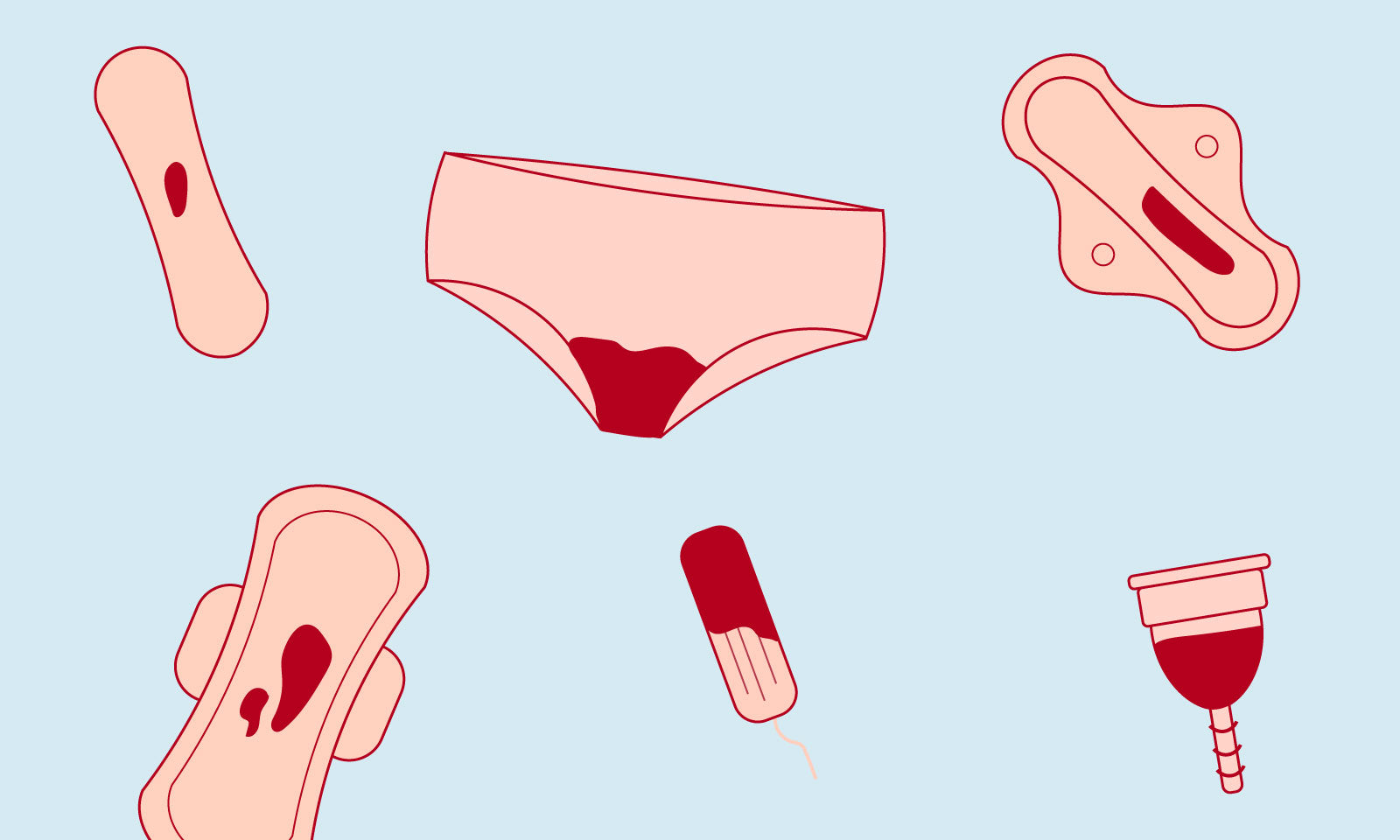How Much Blood Do You Lose On Your Period?

This is a question we’ve probably all been troubled over at some point or another, especially during those certain months when our periods have changed without warning! But how much blood do you lose on your period? Is there an average, or does it differ for everyone? What counts as “too much” and when should you see a doctor?
Below, we’ve put together a great guide on how much blood you should normally lose on your period, what an authoritative and experienced voice would say a heavy period was, and written out some dependable suggestions on what you can do to check how heavy your period is.
How much blood do you lose on your period on average?
It’s difficult to say how much blood one person should lose on average during their period, as the span of “normal” is quite wide. It’s often accepted that you should lose around 30 or 40 millilitres when you’re on your period, or around 2 to 3 tablespoons. However, some research has suggested that you can actually lose up to 60 millilitres, or 4 tablespoons.
Many people will have lighter or heavier periods than this, though, so there’s no need to be alarmed if you think you might be losing more blood than we’ve talked about here. You should find that you’ll never (or hardly ever) actually need to measure the amount of blood you’ve lost.
If you’re not having any worse side effects than usual, like nausea or severe cramping, then it’s likely you’re experiencing a perfectly normal period.
How much blood should you lose on your first period?
If you’re young and you’re worried that your first period is on its way, or if you’re a parent and you care about helping and preparing your child for their first menstrual cycle, you should first know that they can vary by quite a bit.
Usually, when you start your periods they will last between 2 and 7 days, though some can last slightly longer than this. During this time they can either be light, with just a few spots of brownish-coloured blood, or they may start and end light with a heavier flow in between.
Over time your body and your hormones are more likely to settle down and result in shorter periods, so there’s no need to be stressed or scared if it seems like a lot of blood at first. It isn’t really as much as it looks, and as you start to relax into your routine you should find that you’re only losing as much blood as we’ve already mentioned.
What counts as a heavy period?
Periods are counted as heavy when they last for longer than 7 days, or leave pads or tampons fully soaked every hour for several consecutive hours. In some cases, you might pass large blood clots (larger than a 10p coin), or find blood on your clothing and bedding. You might also find that you’re using more than one menstrual product, such as a pad and a tampon, at the same time.
We understand just how frightening and embarrassing this can be, too, especially when you’re only on your first period and can expect more in the future before your body finds its flow. But it’s important to remember that this is something we all go through, there is nothing to be ashamed of, and with our help you could soon find a routine for your period that puts you back at ease.
What counts as a long period?
Most of us will have a period that lasts for a week or less, but the amount you’ll actually bleed during this time can vary. You might even be surprised to find that it’s changed from your last cycle to your next!
Long periods are normally counted as menstrual blood loss that lasts longer than 7 days. If you’d like to learn more about how long a menstrual cycle should usually be, take a look at our helpful blog post ‒ it might help you feel a bit more supported on your period!
You might also hear doctors and other experts talking about “menorrhagia”, which is just a scientific way of saying very heavy menstrual bleeding. Hearing it doesn’t necessarily mean that there’s anything to be concerned about, but you should always talk to them if you feel like you need some reassurance.
How to tell how much you’re actually bleeding
Not all of the menstrual flow you’ll have on your period is blood, which can make it annoyingly difficult if you want to work out how much you’re actually bleeding. A lot of people get uncomfortable to find out that menstrual fluid also contains mucus and a mix of different uterine tissues, but these are totally natural and nothing to feel tense about seeing.
The different hygiene products that you’re using can often give you a more reliable indication of how much blood you’ve lost in a period.
If you’re using a menstrual cup
Different brands and types will also come in different sizes and hold different amounts of flow. This might be anywhere between 30 to 60 millilitres at a time, and even if they don’t have markings on the side you can always do some research and get the amount confirmed on any dedicated brand’s website.
When it’s time to empty your cup, you should note down how much fluid was in it. Wash it out thoroughly, reinsert as needed, and repeat! Go through the same motions for your next three or four periods and you should start to get a clear idea of how much flow you’ve lost over the course of days and weeks.
It’s entirely possible that you’ll find you’re losing more than 60 millilitres of fluid in total. But, like we said, that’s no reason to be anxious! Much of this will be the lining of your uterus, other tissues, and mucus, as well as blood loss.
If you’re using pads, tampons, or period underwear
Reading through the information above might frustrate you if you choose to use pads, tampons, or period underwear instead, but there’s no need to fret about it, either! It might be a little more difficult to find out how much blood you’ve lost on a period, but that doesn’t mean it’s impossible.
To start estimating your blood loss when wearing pads, tampons, or period underwear, take note of how much fluid they’ll hold when fully soaked. Regular tampons, for instance, hold around 5 millilitres of fluid, and super tampons hold double that amount.
If you lose around 60 millilitres while you’re on your period, you’ll most likely go through around 6 to 12 tampons, depending on the size you use.
If you only lose half that amount of fluid, you’ll probably use fewer products than this.
Like the menstrual cup, you’ll find it useful to keep a regularly updated note of how much you’re losing while wearing other products. When you’re recording this, you should also jot down:
- What product you’re using and the size
- How full it is when you have to change it
- How often you have to change it
Having this info and recording it over the next three or four periods should give you a good idea of how much blood you’re losing.
Confidently calculating how much of your menstrual flow is blood
If you’re really interested and want to find out exactly how much of your menstrual flow is blood, you’ll always have to take the other things you’re losing into account. One study conducted by specialists has found that a period flow is around 36% blood and 64% other elements like mucus, uterine lining, and blood clots.
Keeping all of this in mind (and if you’re not that daunted by the maths), you can multiply your total loss by 0.36 to determine the approximate amount of blood you’ve lost. Taking this figure away from the total amount of fluid lost should tell you how much of the fluid is made up of other components. You’ll get an official number on how much blood you’re losing!
To give a constructive example, imagine you’ve collected about 120 millilitres of fluid on a period. If you multiply that by 0.36 you should get a blood loss total of 43.2 millilitres.
After this, take away 43.2 from the 120 total, and you’ll find out how much of the fluid loss is made up of other components. In this case, it’s 76.8 millilitres.
What could cause heavy bleeding on your period?
Some of us are lucky enough to have light periods right from the start, while some others might be disappointed to find that theirs are heavy from the start, or have even gotten heavier over time. A few of the things that might make this happen include:
- Adenomyosis (uterine tissues embedding themselves in your uterine walls rather than coming away with menstrual flow)
- Bleeding disorders (such as Von Willebrand disease)
- Certain medications
- Endometriosis
- Fibroids (non-cancerous tumours)
- Having an IUD fitted
- Hypothyroidism Pelvic inflammatory disease (PID)
- Polycystic ovarian syndrome
- Polyps (non-cancerous growths)
If you’ve been wondering or even starting to panic over why your periods could be so heavy, take a look at our advice for some in-depth details and friendly tips on what you can do to manage those periods that are a little more overwhelming.
Some of the things we’ve listed might even help take care of painful cramps, unpleasant bloating sensations, and a few other things that can leave us feeling restless on our more delicate days!
When to talk to your doctor
Periods will change from month to month for a lot of people, and you know better than anybody what your own period should look and feel like. That’s why, if anything ever starts to feel abnormal for you and it’s making you afraid that something could be wrong, the best thing to do is talk to your doctor.
The NHS encourages you to go and speak to your healthcare provider if:
- You’re feeling nervous about your bleeding as it currently is
- Your periods have suddenly gotten heavier
- You’re having other distressing symptoms, such as pain or bleeding between your periods
What your doctor can do for you
When you go to have a soothing (and hopefully beneficial) chat with your GP, they should start by asking you about the symptoms you’re having. They might also ask if you’ve had any recent or sudden changes, like bleeding between period cycles or unexpected and unexplained pain.
It’s normal for an NHS GP to offer people with heavy periods a blood test, to check for iron deficiency anaemia, and they might carry out a professional physical examination. They might also order further tests, which can include:
- Further blood tests
- Hysteroscopies (a narrow telescope with a light and camera at the end is passed in through the vagina to examine the womb)
- Ultrasound scans
Treatment for heavy periods
A doctor can also give approval for a range of treatments to help with the burden of particularly heavy periods. The one they choose for you may depend on what’s causing the problem in the first place, your health in general, and what feels most agreeable to you. As such, you may be offered:
- An endometrial ablation, where part of the womb lining is removed
- An intrauterine system (IUS), where a device that contains the hormone progesterone is inserted into your womb
- A hysterectomy, where the womb is removed entirely
- A myomectomy, which is surgery to remove fibroids
- A uterine artery embolisation, which is a procedure use to shrink fibroids
- Medicines with hormones (such as the combined oral contraceptive pill)
- Medicines without hormones (such as non-steroidal anti-inflammatory drugs)
Many people think that the combined oral contraceptive pill will stop your period, but this is a simple misunderstanding. To find out the truth and to get some trusted information on the subject, please don’t hesitate to take a look at our advice page. You might even be pleased to find a contraceptive type that works better for you there!
A few quick tips for symptom relief and management
Whether or not you suffer through heavy periods, we totally understand how it feels to have to get around those irritating period symptoms every month! Here, we’ve laid out a few fast tips you can start using right away, whether you’re already on your period, you’ve got it marked down on the calendar, or even if you’re just getting that dreadful, achy feeling that tells you it’s coming:
- Drink lots of water and stay hydrated
- Eat foods that are good for period cramps and other symptoms
- Keep a log or record of your periods, the symptoms you’re getting every month, and the products you use to take care of it
- Take painkillers such as ibuprofen
- Use a warm compress, such as a hot water bottle, to help settle those dull or stabbing cramps (we know they can be both!)
Staying leak-proof and comfortable on any flow
If you’ve got a heavy menstrual flow, no doubt one of the things you’re thinking about most is making sure no one accidentally finds out. This is where we’re delighted to step in and help with our super-soft, stylish, and totally absorbent period pants!
Our fantastic undies come built with multi-layer technology that keeps them from leaking, sparing you the awkwardness (and sometimes, unfortunately, humiliation) of having your period leak through in public. Our different styles can even hold different tampons’ worth of fluid, so you’re bound to find pairs that you love and that fit your flow!
Browse through our collections and order online for a quick, comfortable change to your period today. We’ve even got a risk-free, 60-day money back guarantee if you’re not totally happy with your purchase!
- Tags: Myths & Facts Periods



